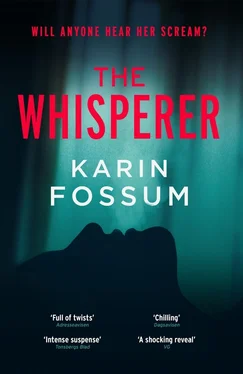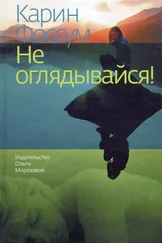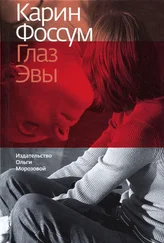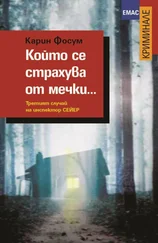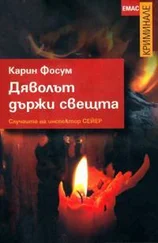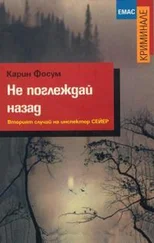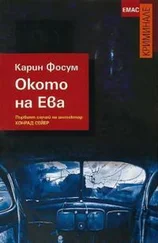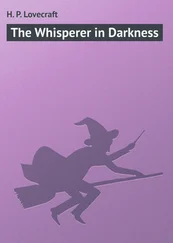They worked shifts. From ten to five or from one to eight, which suited her fine. She lived alone in the house in Kirkelina and had no one else to take into consideration. Obviously being alone made her vulnerable, but it also gave her a sense of freedom and control. She came and went as she pleased, no one was waiting, no one asked questions. But she did think about Rikard Josef every day, she was glad that she had the experience of having a child, that she could be part of the conversation when her colleagues talked about their children, which they did all the time.
Not that she had a great deal to say about her son. What little she knew, she had already told them long ago, but she was happy to tell them again. Or she embellished it a bit, exaggerated to stretch out the conversation. She was proud of him, in a way, even though he had more or less cut all contact with her. Never a letter, never a phone call, never a visit. Only the usual card at Christmas, and sometimes one for her birthday on 17 June. She once got a card from Pattaya, where he was on holiday. Alone, she guessed, as there was no mention of anyone else. But it was gratifying to be able to tell her colleagues that he ran a hotel in Berlin called the Dormero, which had five stars on TripAdvisor. She had never been there, it was true — he had never invited her — but she had seen pictures on the Internet. Often, when she longed to see him, she could while away an entire evening dreaming and looking at photographs of the lounges and suites and restaurants. The large, open reception lobby with chandeliers, the bar with deep armchairs. If she was honest, it was her greatest dream: to board a plane for Berlin and to be met by her son at arrivals, then be driven into the centre of town in a big Mercedes perhaps, and shown around what had become his life’s work. Eat well in a beautiful dining room, sleep in a room that he had chosen especially for her, maybe even a suite. But it never happened. And the years passed. Only the card for her birthday and another for Christmas with an angel or a star, and a formal, printed message in German. And his name of course, or just his initials, in barely legible writing. She doubted he could remember how old she was each year. He was only seventeen when he left her, full of dreams and ambitions; it had cost him nothing to turn his back. She had been thirty-four at the time, and more than ten years had passed since that dreadful day.
What if I just went there, she suddenly thought, and found my own way to the hotel, and turned up at reception with a suitcase in my hand? And asked for the manager. He would appear only a few moments later, from a door behind the reception desk, of course, presumably in a smart suit. He would walk across the carpet, with a casual elegance, and look at her questioningly. It would take a few seconds before he recognised her, she could just imagine his wide-eyed expression of surprise, perhaps even shame. She would stand there stammering, words he could not hear, to even greater embarrassment. He did not know that she had lost her voice, did not know about the catastrophe. She struggled to understand how this had happened to them, had never dared to ask. He was ambitious, it was true, and longed for adventure. Qualities she did not have. The fact that he had got a senior position before the age of thirty filled her with pride.
It was mainly her fault that things had ended up this way. Getting pregnant with a man who was well over forty, with his own family already, of course, and he had no plans to leave them — not the smartest thing to do. So Rikard grew up without a father. But how she had loved him and looked after him! How she had carried him both day and night. She was no longer interested in what other girls of her age did; she did not feel she was missing anything, not going out or seeing boys her own age, not falling in love. She was head over heels with her son and that was enough. The sight of him, the smell of him, his downy hair, his wet mouth. She had no dreams of a big family or status. It was just her and her boy.
There were ten minutes left of her shift. She pushed the heavy shopping trolley out into the shop. There were two open boxes of things for the bathroom in the trolley itself, and the box she had overlooked, which Lars then came rushing out with and popped on top.
She started to put the toilet brushes out on the shelf; they were plastic, in three different colours, and cost nineteen kroner each, which was a bargain. When she had put them all out, with a stretch of the imagination, they looked like flowers in a bed, red, purple and pink. She knew that not everything was of the best quality. The candles they sold dripped and ran, and did not last as long as other, more expensive candles. The coffee was thin and bitter, and the boxes of chocolates were often so old that the chocolate was dry and grey. Sometimes the chocolates were covered in a white film because the box had been exposed to changes in temperature. But a lot of the other stuff was good. The plastic containers and rag rugs, ready-made curtains, cotton towels, kitchen equipment and tools. When she had finished with the toilet brushes, she opened the box that Lars had given her. She could see the word ‘Malaysia’ on it. It contained eight smaller boxes. She chuckled when she discovered that each box contained a ceramic skull, which was actually quite realistic, on a small base. She took one out and saw that there was a small red bulb in each eye socket. They came with two AA batteries that were to be put in the base. She opened the cover and put in the batteries, and immediately the dark sockets lit up. She then arranged the remaining seven boxes on the shelf, and put the skull with the working lights on top. She thought for a few moments about the children who might get one for Christmas and keep it on their bedside table. They would lie alone in the dark staring into the red eyes, like she was right now; in fact she stayed staring at them for some time, unable to turn away, there was something insistent about them. She wanted to show them to Gunnhild so they could laugh together.
She slotted the empty trolley back in with the others, went to the staffroom, put on her coat, picked up her handbag and whispered goodbye to Gunnhild and Lars, having first pointed out the skulls to them. It was Gunnhild and Lars that she got on best with. Some people only worked part-time or at the weekends, and she tended to ignore them. And made sure that they ignored her. Her world had to be small and manageable, because then she was in control. It was a quarter past eight when she got to the bus stop, a dark autumn evening. Four people were waiting for the bus. The othersstood in the bus shelter, and she stayed out on the pavement with her back to them. For years, she had always sat in the same place, by the window three seats back from the driver. If the place was taken, she was upset. She felt displaced. Someone was encroaching on her territory. Today the seat was empty and she had a good feeling when she sat down, almost like slipping into something that fitted perfectly.
The bus took forty minutes to get to Kirkelina. She liked being on the bus, looking out through the window. Sometimes, when she was tired, she leaned her cheek against the cool glass and closed her eyes. Every time the bus passed a street light there was a flash under her eyelids. Her thoughts were always freer when she was moving, encased by the body of the bus, like a thick shell. She had come to love the journey home, her favourite time when she was still part of the world and the traffic, but protected all the same.
The street was dark and empty when she got off the bus. It was only a few minutes’ walk to the house, but first she quickly crossed the road to Irfan’s shop. It was always open. She liked to think that Irfan slept on a mattress out the back, and every time the bell above the door went, be it night or day, he jumped up to be of service. The bell rang as she opened the door, grandly announcing her arrival. She was met by the exotic smells of spices and other delicacies from Turkey, Irfan’s home country. She bought rice and tea and tomatoes and some big home-made flatbreads that she liked to eat with cheese and ham. And four bottles of Uludag Frutti. Whenever she went into Irfan’s shop, which was bright and warm, she wandered along the shelves in delight. His shop was not like Norwegian shops, it was more like a miniature market, full of colours and smells. There was a special shelf for perfume in gaudy bottles. Every now and then she would pick one up and take off the lid. They all smelt cheap and sharp, but then they didn’t cost much either. Starry Night. Secret Dream. Killer Queen. He also had lots of dried fruit, biscuits and jars of interesting sauces. Nappies and soap, and fruit and veg. He didn’t take away the fruit even though it had brown marks on it; the bananas could be there for ages before he put out new ones. The carrier bags were the simplest sort, thin, with no advertisements. If she bought anything heavy, she had to carry the bags in her arms, as the handles tended to break. But she only had to cross the road and then she was home. Irfan was a handsome man, some years younger than her, slim and dark-haired with golden skin. He never smiled. He had a restlessness about him, as though his body was constantly vibrating with worry. He often spoke on his mobile phone at the same time as serving her; sometimes he spoke to himself, in his own, to her incomprehensible, beautiful language. He was forever glancing out the window, as if he was looking for someone, and yet always had time to say a few words in his broken Norwegian before finishing the conversation with a nod. Perhaps he had learned that from her.
Читать дальше
